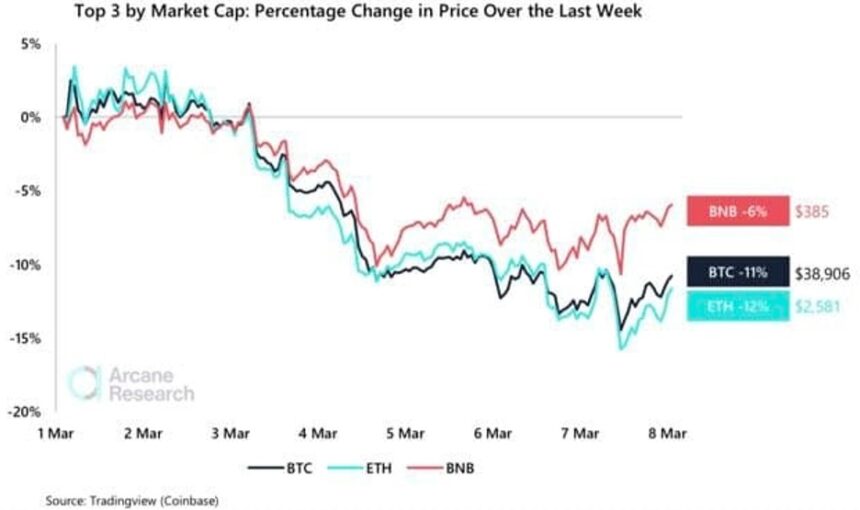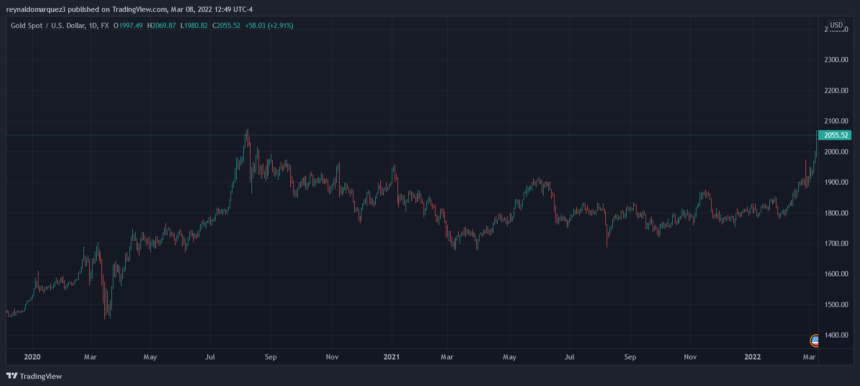Bitcoin has failed to display strength during the past week and remains at risk of revisiting previous lows. The benchmark crypto seems to be negatively reacting to the current macro-environment, and an overall weakness from the buying side.
Related Reading | Risk Aversion Pulls Crypto Market Down, Bitcoin Still Below $40K
At the time of writing, the price of Bitcoin trades at $38,544 with a 1.2% loss in 24 hours and a correction of 10.8% in the last week.
As NewsBTC reported yesterday, Bitcoin has been in an “equilibriums” with speculator dumping their coins for a loss as bulls attempt to create a floor. This status quo has existed since Q4, 2021, leading to BTC’s price moving sideways for months.
Although constant, this state in the market is fragile and could break into either direction, but the downside seems likely. In the short term, bulls have failed to prevent BTC from breaking below and support at around $40,000.
Data from Material Indicators (MI) continues to record an important stack of bid orders at around $36,000, and $35,000. In addition, as BTC moved into $40,000 recently, there has been a quick response from sellers which could be trying to keep the price suppressed.
This dynamic in combination with low demand hints at a potential active attempt for entities trying to fill their bags at lower levels. A return into the mid-area around $40,000 could invalidate this theory.
In a recent report, Arcane Research highlights two major macro events which seem poised to bring in volatility into Bitcoin and the crypto market. On Thursday, the U.S. will print a new CPI for February which is expected to continue its uptrend and hit 7.9%.

Due to the Russia-Ukraine conflict, there is a lot of uncertainty on how the U.S. Federal Reserve (FED) will react to higher inflation. At the moment, the markets seem to believe it will be to the downside for risk-on assets, such as Bitcoin.
Inflation, War, And An Unpleasant Week For Crypto Investors
The previous thesis seems to be supported by a rise in commodities. The price of Gold (XAU) has been on a rally after the Russian invasion of Ukraine. The precious metal trades north of $2,000, a price was last seen in 2020 post the implementation of lockdown measures to prevent the spread of COVID-19.

During that period, when Gold began its rally, Bitcoin suffered from a downtrend as global uncertainty unfolded. Other commodities have begun an uptrend, like BTC, ETH, XRP, ADA, and other large-cap cryptocurrencies suffer. Arcane Research noted:
Further, the war in Ukraine has huge implications on the commodity markets leading wheat, oil, gas, and nickel to soar – this may complicate central banks’ effort to combat inflation. More importantly, surging commodity prices may have spill-over effects, and we already see odd signals in Egypt and Poland.
Related Reading | TA: Bitcoin Faces Uphill Task, Why BTC Bears Are Still In Control
If central banks, particularly the U.S. FED, consider inflation to be a more persistent issue than initially thought, it may lead them to take faster and more aggressive monetary measures. A hawkish FED could turn worse for an already soft crypto market.



